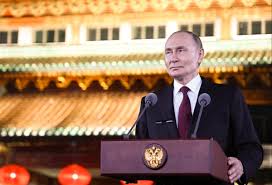Extension of "New START": A Ray of Hope Amid Rising International Tensions

The Kremlin expressed concern about the treaty's expiration without a replacement, warning of the world entering a phase "fraught with great risks" if there are no documents regulating strategic security. Putin viewed the extension as a means "to prevent a new arms race and maintain an acceptable level of predictability" in these turbulent times.
However, this Russian step is not without conditions, as Putin conditioned the extension on the United States agreeing to adhere to the same restrictions. This puts the ball in the American court at a time when bilateral relations are under severe strain due to the war in Ukraine and Western support for Kyiv.
Experts propose several interpretations for this Russian shift. It may be a response to changes in President Trump's policy towards Ukraine, who announced the possibility of Kyiv's victory and continued sending advanced weapons. It may also reflect Russia's desire to buy time to assess new technical challenges such as hypersonic weapons and artificial intelligence.
The economic factor cannot be overlooked, as Russia faces financial pressures that may affect its ability to continue modernizing its nuclear arsenal under Western sanctions. Additionally, developments in the American missile defense program, especially the "Iron Dome" project, raise Russian concerns about the erosion of nuclear deterrent capabilities.
The biggest challenge will be to reactivate the monitoring and verification mechanisms that Russia froze in 2023. Without these mechanisms, the extension loses much of its practical value. This requires resuming technical dialogue away from political disputes.
The competition with China remains a significant factor in this equation, as Beijing seeks to become a third major nuclear power, adding a new dimension to disarmament strategies.
Despite all these challenges, extending the treaty is a step in the right direction. History has shown that arms reduction negotiations continued even during the worst periods of the Cold War. Today, amid more complex tensions, keeping these channels open seems more urgent than ever.
Success in these efforts will not only maintain strategic stability but may also open a window for cooperation in other areas. In a world where crises intertwine, international treaties remain a lifeline preventing a slide into an unknown that could have dire consequences.
